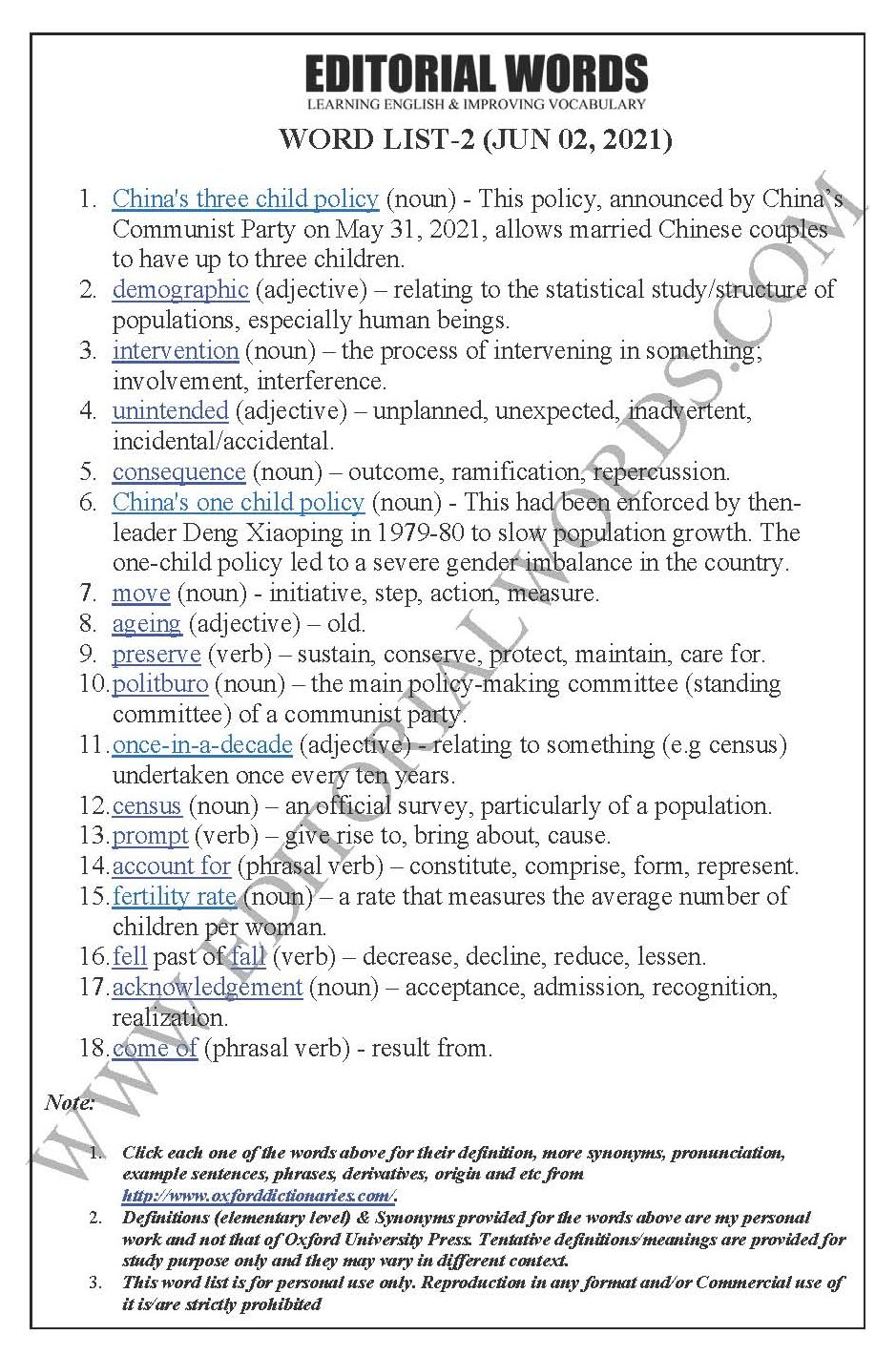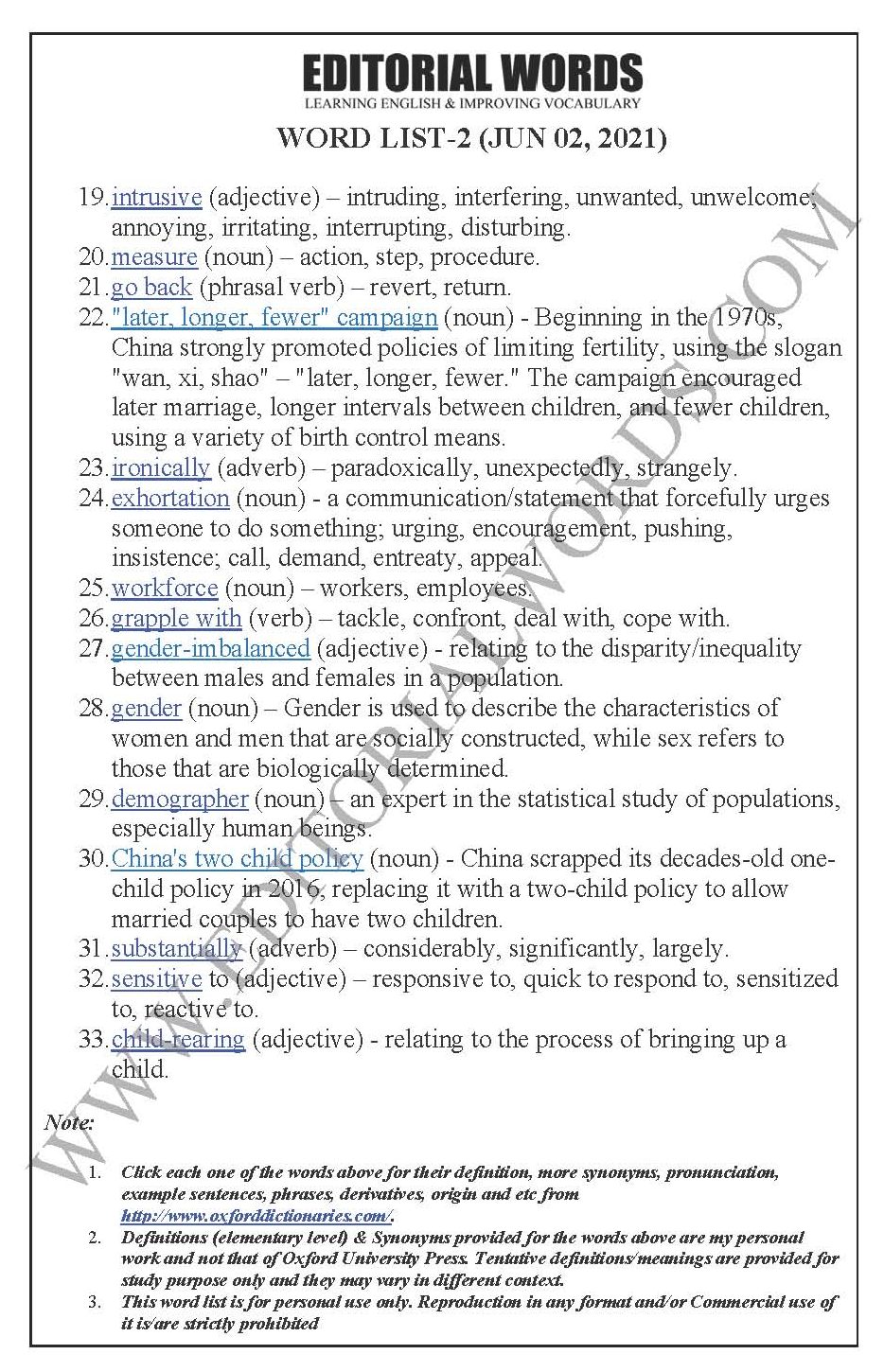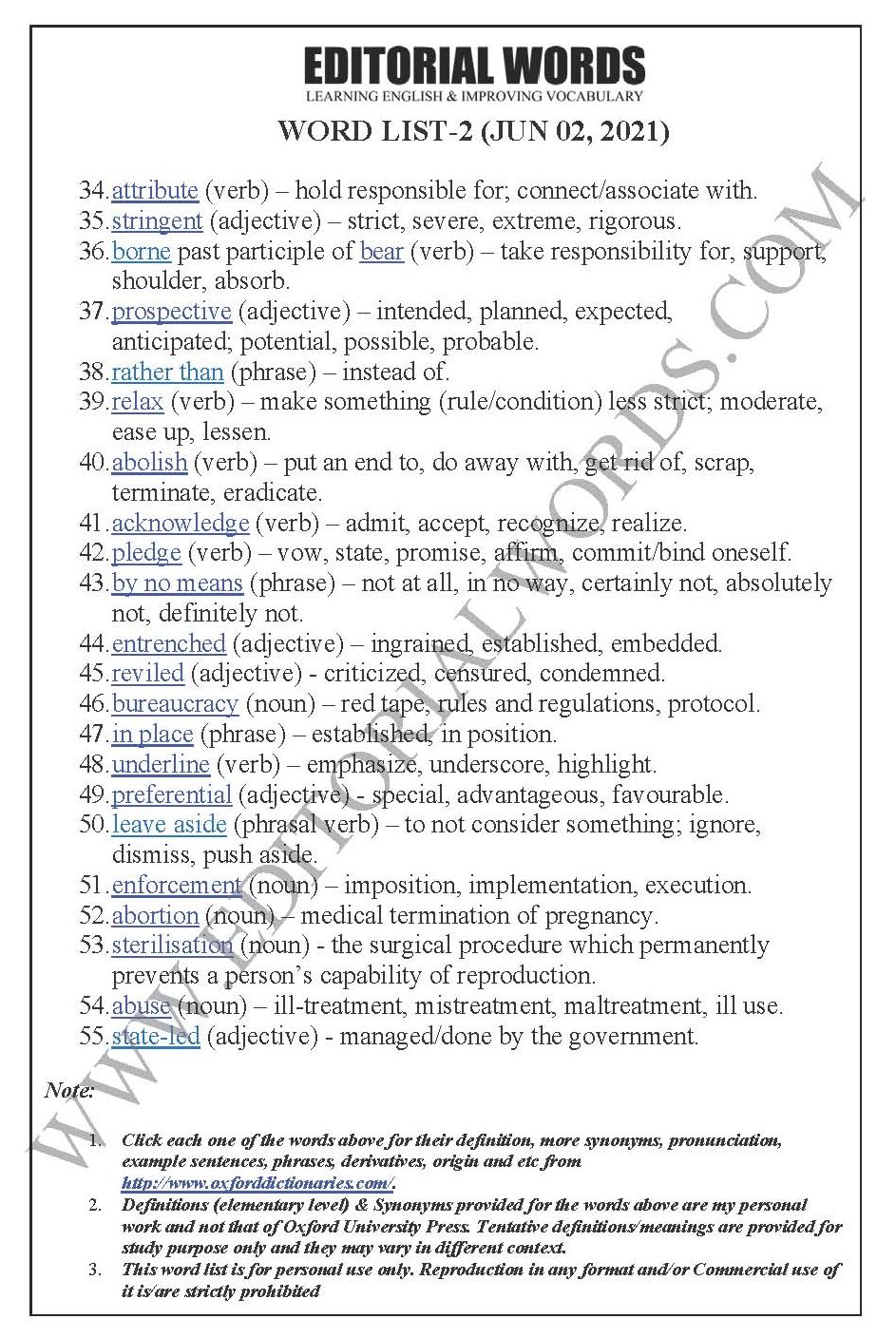The Hindu Editorial (When two is too little) – Jun 02, 2021
Six years after abandoning the “one child policy” of 1979, China’s Communist Party has now introduced a “three child policy”. For further reading, visit “The Hindu”. Below is today’s word list-2 for The Hindu Editorial (When two is too little) – Jun 02, 2021.
To read this article, click here.
This preview is provided here with permission.
Courtesy: The Hindu
The Hindu Editorial (When two is too little) – Jun 02, 2021:
- China’s three child policy (noun) – This policy, announced by China’s Communist Party on May 31, 2021, allows married Chinese couples to have up to three children.
- demographic (adjective) – relating to the statistical study/structure of populations, especially human beings.
- intervention (noun) – the process of intervening in something; involvement, interference.
- unintended (adjective) – unplanned, unexpected, inadvertent, incidental/accidental.
- consequence (noun) – outcome, ramification, repercussion.
- China’s one child policy (noun) – This had been enforced by then-leader Deng Xiaoping in 1979-80 to slow population growth. The one-child policy led to a severe gender imbalance in the country.
- move (noun) – initiative, step, action, measure.
- ageing (adjective) – old.
- preserve (verb) – sustain, conserve, protect, maintain, care for.
- politburo (noun) – the main policy-making committee (standing committee) of a communist party.
- once-in-a-decade (adjective) – relating to something (e.g census) undertaken once every ten years.
- census (noun) – an official survey, particularly of a population.
- prompt (verb) – give rise to, bring about, cause.
- account for (phrasal verb) – constitute, comprise, form, represent.
- fertility rate (noun) – a rate that measures the average number of children per woman.
- fell past of fall (verb) – decrease, decline, reduce, lessen.
- acknowledgement (noun) – acceptance, admission, recognition, realization.
- come of (phrasal verb) – result from.
- intrusive (adjective) – intruding, interfering, unwanted, unwelcome; annoying, irritating, interrupting, disturbing.
- measure (noun) – action, step, procedure.
- go back (phrasal verb) – revert, return.
- “later, longer, fewer” campaign (noun) – Beginning in the 1970s, China strongly promoted policies of limiting fertility, using the slogan “wan, xi, shao” – “later, longer, fewer.” The campaign encouraged later marriage, longer intervals between children, and fewer children, using a variety of birth control means.
- ironically (adverb) – paradoxically, unexpectedly, strangely.
- exhortation (noun) – a communication/statement that forcefully urges someone to do something; urging, encouragement, pushing, insistence; call, demand, entreaty, appeal.
- workforce (noun) – workers, employees.
- grapple with (verb) – tackle, confront, deal with, cope with.
- gender-imbalanced (adjective) – relating to the disparity/inequality between males and females in a population.
- gender (noun) – Gender is used to describe the characteristics of women and men that are socially constructed, while sex refers to those that are biologically determined.
- demographer (noun) – an expert in the statistical study of populations, especially human beings.
- China’s two child policy (noun) – China scrapped its decades-old one-child policy in 2016, replacing it with a two-child policy to allow married couples to have two children.
- substantially (adverb) – considerably, significantly, largely.
- sensitive to (adjective) – responsive to, quick to respond to, sensitized to, reactive to.
- child-rearing (adjective) – relating to the process of bringing up a child.
- attribute (verb) – hold responsible for; connect/associate with.
- stringent (adjective) – strict, severe, extreme, rigorous.
- borne past participle of bear (verb) – take responsibility for, support, shoulder, absorb.
- prospective (adjective) – intended, planned, expected, anticipated; potential, possible, probable.
- rather than (phrase) – instead of.
- relax (verb) – make something (rule/condition) less strict; moderate, ease up, lessen.
- abolish (verb) – put an end to, do away with, get rid of, scrap, terminate, eradicate.
- acknowledge (verb) – admit, accept, recognize, realize.
- pledge (verb) – vow, state, promise, affirm, commit/bind oneself.
- by no means (phrase) – not at all, in no way, certainly not, absolutely not, definitely not.
- entrenched (adjective) – ingrained, established, embedded.
- reviled (adjective) – criticized, censured, condemned.
- bureaucracy (noun) – red tape, rules and regulations, protocol.
- in place (phrase) – established, in position.
- underline (verb) – emphasize, underscore, highlight.
- preferential (adjective) – special, advantageous, favourable.
- leave aside (phrasal verb) – to not consider something; ignore, dismiss, push aside.
- enforcement (noun) – imposition, implementation, execution.
- abortion (noun) – medical termination of pregnancy.
- sterilisation (noun) – the surgical procedure which permanently prevents a person’s capability of reproduction.
- abuse (noun) – ill-treatment, mistreatment, maltreatment, ill use.
- state-led (adjective) – managed/done by the government.
Note:
1. Click each one of the words above for their definition, more synonyms, pronunciation, example sentences, phrases, derivatives, origin and etc from http://www.oxforddictionaries.com/.
2. Definitions (elementary level) & Synonyms provided for the words above are my personal work and not that of Oxford University Press. Tentative definitions/meanings are provided for study purpose only and they may vary in a different context.
3. This word list is for personal use only. Reproduction in any format and/or Commercial use of it is/are strictly prohibited.
The Hindu Editorial (When two is too little) – Jun 02, 2021:



“Phrasal Verbs” We Learnt Last Week
“Idioms & Phrases” We Learnt Last Week
“Important Definitions” We Learnt Last Week
Recent Word Lists For The Hindu Editorial Articles

Be the first to comment